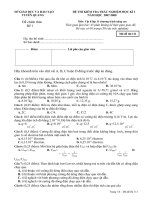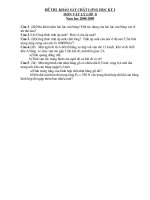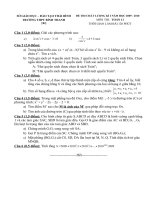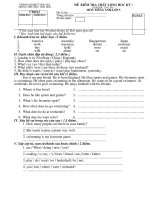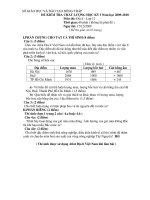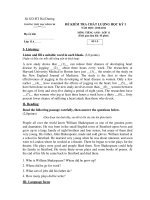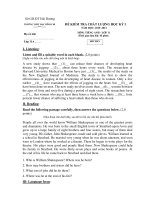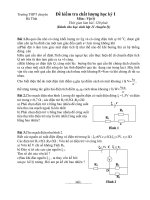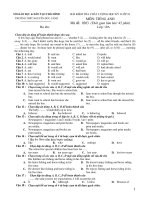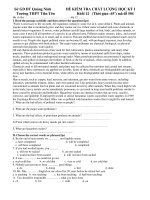KIỂM TRA CHẤT LƯỢNG HỌC KỲ I ĐỀ SỐ 1 ppsx
Bạn đang xem bản rút gọn của tài liệu. Xem và tải ngay bản đầy đủ của tài liệu tại đây (53.78 KB, 3 trang )
KIỂM TRA CHẤT LƯỢNG HỌC KỲ I
ĐỀ SỐ 1
I/. Choose the word or phrase among A, B, C, or D:
Around the age of eighteen, you must make one of the biggest decisions of your life. "Do I stay on
at school and hopefully go on to university later? Do I leave and start work or begin a training (1) ?"
The decision is yours, but it may be (2) remembering two things: there is more
unemployment among people who haven't been to university, and people who have the right skills will
have a big advantage in the competition for jobs. If you decide to go straight into a job, there are many
opportunities for training. Getting qualifications will help you get on more quickly in many careers, and
evening classes allow you to learn (3) you earn. Starting work and taking a break to study when you
are older is another possibility. By this way, you can save up money for your student days as well as
(4) practical work experience.
1 : A. class B. course C. term D. school
2 : A. useful B. worth C. important D. necessary
3 : A. when B. what C. where D. while
4 : A. doing B. making C. getting D. taking
II/. Choose the item among A, B, C or D:
Education is not an end, but a means to an end. In other words, we do not educate children only for the
purpose of educating them. Our purpose is to fit them for life.
In some modern countries it has, for some time, been fashionable to think that by free education for all -
whether rich or poor, clever or stupid - one can solve all the problems of society and build a perfect nation.
But we can already see that free education for all is not enough; we find in such countries a large number of
people with university degree; they refuse to do what they think "low" work; and, in fact, work with hands
is thought to be dirty and shameful in such countries. But we have only to think a moment to understand
that the work of a completely uneducated farmer is far more important than that of a professor; we can live
without education, but we die if we have no food. If no one cleaned our streets and took the rubbish away
from our house, we should get terrible diseases in our own towns.
In fact, when we say that all of us must be educated to fit us for life, it means that we must be
educated in such a way that, firstly, each of us can do whatever work suited to our brains and ability and,
secondly, that we can realize that all jobs are necessary to society, and that is very bad to be ashamed of
one's work. Only such a type of education can be considered valuable to society.
5 : The writer wants to prove that
A. our society needs all kinds of jobs
B. people with high education refuse to do what they think "low" work
C. our society needs free education for all
D. a farmer is more important than a professor
6 : The purpose of education is ………………………………………………………
A. to build a perfect world B. to let everyone receive education fit for him
C. to choose a system of education D. to prepare children mainly for their future work
7 : According to the passage, ……………………………………………………………
A. work with hands is dirty and shameful
B. work with hands is the most important
C. we can't regard work with hands as low work
D. work with hands is low work
8 : The passage tells us about of education.
A. the type B. the system C. the value D. the means
9 :My résumé enclose / contact / me /every afternoon /look forward to / be interviewed
A. My résumé is enclosed. Please contact me every afternoon. Therefore, I am looking forward to being
interviewed.
B. My résumé enclosed and contact me every afternoon. I look forward to be interviewed
C. My résumé which is enclosed, so please contact me every afternoon. I am looking to being
interviewed.
D. My résumé is enclosed. You can contact me every afternoon. I am looking forward to being
interviewed.
10 : "Congratulations! You did great." - " "
A. It's nice of you to say so B. It's my pleasure
C. That's okay D. You're welcome
11: large number of Indian men agreed that it was unwise to confide in their wives A. Ø
B. An C. The D. A
12 : "Would you like to go to the movies tonight?" - " "
A. No, I don't like B. Of course C. I'd love to D. Yes, I'd like
13 : Which underlined part has the different pronunciation from the rest?
A. early B. university C. identity D. apply
14 : "What a lovely house you have!" - " "
A. You're welcome B. Thank you C. Of course D. I think so
15 : Emily said that her parents to Paris .
A. would go / the next day B. had gone / the day after
C. will go / tomorrow D. went / tomorrow
16 : In England, primary education is provided by state schools run by the government and by
fee-paying schools.
A. independent B. independently C. independence D. depended
17 School uniform is required in most of Vietnamese schools.
A. divided B. depended C. compulsory D. paid
18 : Which underlined part has the different pronunciation from the rest?
A. chore B. school C. teacher D. children
19 : Are you fond newspapers and magazines?
A. of having read B. of reading C. of read D. reading
20 : Learning English, I find prepositions very
A. interested B. interestingly C. interest D. interesting
21 : yet?
A. Have the letters typed B. Have the letters been typed
C. Have been the letters types D. Had the letters typed
22 : Which word has the stress differently from the rest?
A. environment B. experience C. optimistic D. technology
23 : If there weren't the pull of the earth, everyone the same weight.
A. would be of B. will be of C. are of D. is of
24 : He advised too far.
A. she did not go B. her do not go
C. her did not to go D. her not to go
25 : Education and training are an important steps in getting the kind of job that you
A B C D
would like to have.
26 :The Major has promised that the living standard of the people in that city
A. will be raised B. raised C. raise D. has raised
27 : Recently, there has been a lot of debate about students have to pay their own fees at
university A B C
D
28 : We are working, that means that we are contributing goods and services to our city.
A B C D
29 : Economic reform usually refers to actions of the government to improve
A B C
efficiency in economy markets.
D
30 : We must our forests and woodlands for future generations.
A. conservational B. conservation C. conserving D. conserve
31 : Many people believe that human beings will never used up all natural resources on
earth.
A. the / a B. Ø / the C. a / the D. the / Ø
32 : Which word has the stress differently from the rest?
A. impression B. company C. interview D. formally
33 : ' "Good morning, Mary! How are you?" Henry said'?
A. Henry greeted Mary and asked how she was.
B. Henry greeted Mary and asked how is she.
C. Henry said good morning Mary and asked how was she.
D. Henry said good morning and asked Mary how she is.
34 : My parents their favourite show on TV when Daisy last night.
A. watched / was calling B. have watched / called
C. were watching / called D. watched / had called
35 : "Thank you for the nice gift." - " "
A. You're welcomed B. I'm glad you like it
C. But do you know how much it costs? D. In fact, I myself don't like it
36 : I there once a long time ago and back since.
A. have been / will not be B. was / have not been
C. had been / was not D. would be / had not been
37 : the rain, the baseball game was not cancelled.
A. In spite of B. Even though C. Although D. Despite of
38 : "Despite his ability to do the job, he was not offered the position".
A. It was his ability that helped him do the job and get the position.
B. Although he was able to do the job, but he was not offered the position.
C. He was not offered the position, regardless of his ability to do the job.
D. If he had enough ability to do the job, he would be offered the position.
39 : I / read / advertisement / your company / today's newspaper.
A. I enjoy reading the advertisement from your company in today's newspaper.
B. I have just read the advertisement of your company in today's newspaper.
C. I would like to read the advertisement of your company on today's newspaper.
D. I read the advertisement which is of your company in today's newspaper.
40 : His ideas about marriage are quite different mine.
A. from B. on C. with D. for
